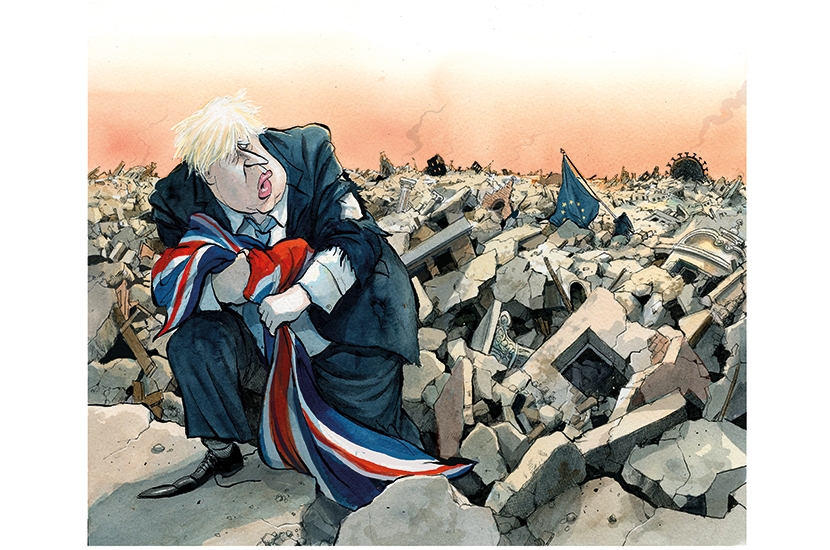Where are we again? Oh yes: a newish Conservative prime minister has confounded his critics by winning a general election that most expected would lead to a hung parliament. The result has caused Labour to drop its leader and replace him with someone more reassuring and substantial. And before the Government can work on its main domestic agenda, a giant convulsion has reared its ugly head to turn the world of politics upside down.
That’s right, we are in the autumn of 1992, in the aftermath of ‘Black Wednesday’. The pound has crashed out of the European exchange rate mechanism, despite the Government imposing sky-high interest rates in a bid to hold it steady against the Deutschmark – a policy that has inflicted great damage on exporters and mortgage-holders alike.
Many families have been left in negative equity and cannot afford their monthly repayments. Thousands of businesses cannot service their loans and have gone to the wall. Unsurprisingly, the Tory poll rating has tanked.
And that, of course, is where the parallels with the present day break down.
Comparing polling around the time of Black Wednesday with today (with thanks to the political strategist Mark Pack for compiling spreadsheets of historic polling) throws up some fascinating clues as to why the Conservatives are still presently ahead in the polls.
In 1992, the election of John Smith as Labour leader resulted in the party having a modest bounce in the polls, giving it a small late-summer lead over the Tories of around four points. By early September polling was nip and tuck again. But a poll taken on Black Wednesday and the next day showed Labour with an eight-point lead. A month further down the line, in mid-October, Labour was around 20 points ahead, with the Tory rating slumping into the low 30s. And that was pretty much that.
The Conservatives were behind – almost always by double digits – in every poll from Black Wednesday until the 1997 general election. Their plight became progressively worse over time, with their poll rating developing a ceiling of 30 per cent during 1993 and then often slipping into the mid-20s once Tony Blair had become Labour leader in 1994.
In the end, the story of John Major’s premiership was that he surprised his detractors by winning a fourth successive majority for the Tories in 1992, but was then broken by the nightmare of Black Wednesday and spent almost half a decade withering away until he was put out of his misery by the electorate in May 1997.
Boris Johnson also surprised his detractors by securing a fourth successive term in government for the Tories in December 2019, but his premiership has not been broken by the nightmare of Covid-19 in the spring and summer of 2020.
Indeed, despite Keir Starmer providing Labour with a modest poll bounce, Johnson’s Conservatives have led in every poll during 2020, even as evidence has mounted of grievous mistakes in the Government’s response to Covid. The Tories now seem to have a floor in their poll rating of at least 40 per cent, while that appears to be Labour’s ceiling.
Why might this be? Two factors jump out immediately. The first is that while the Black Wednesday debacle flowed inexorably out of Major’s flawed monetary and exchange rate policy, the Covid pandemic flowed out of China. Johnson’s administration is not primarily culpable in the same way.
The second is that while Major largely left mortgage-payers and small business owners (two important sections of the traditional Tory vote) to sink or swim alone, Johnson’s administration has built an extraordinary economic life raft for them. In his own words, the Government has ‘put its arms around’ British businesses and households to ensure they stay afloat. In this enterprise, the unscheduled replacement of Sajid Javid as Chancellor by the emotionally articulate Rishi Sunak has turned out to be an important stroke of luck.
This analysis would lead one to think that much depends on Sunak’s ability to keep the laws of fiscal gravity suspended for a good while longer – and indeed it does. But I think there is rather more going on here.
There actually is a lot of public abrasiveness around about the performance of Johnson’s administration. But most of the political energy behind it comes from right-wing, not left-wing impulses. Many Tories are upset about civil liberty infringements in recent Johnsonian edicts on Covid. There are growing frustrations among working class and older voters about the Government’s failure to stem illegal immigration and the apparent transformation of many hotels into auxiliary hostels for asylum-seekers. There is also mounting concern about a lax public order response to the Black Lives Matter demos, including the recent appearance of a nascent uniformed black militia in Brixton.
Starmer’s Labour is unable to connect with any of these currents of opinion. On the contrary, most of the voters unhappy about the Government’s handling of these issues would regard Labour’s approach to them as being substantially worse. The party is more cautious on Covid, more lax on irregular migration and full-on kneelers when it comes to the BLM agenda.
There is also Brexit, of course, where Starmer has baggage that makes it extremely difficult for Labour to win back many voters it lost in December.
There is one man far better placed than Starmer to drive the Tory poll rating below 40 per cent and thereby hand Labour a lead. His name is Nigel Farage and he has lately been giving forth about all of the issues mentioned above. Should he put a new political vehicle on the road there is every change that a big chunk of Tory supporters would hop on board at least for some mid-term adventures.
In the absence of such a move, it seems likely that Tory poll rating will stay robust. The Conservative Party’s support has developed herd immunity to the charms of Starmer and Labour.







Comments